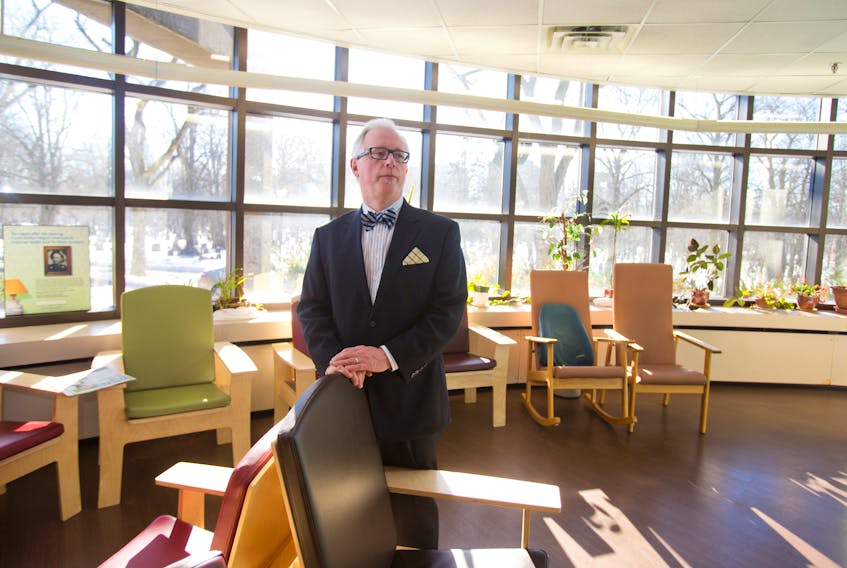New research is further revealing that the risk of developing dementia can be substantially reduced by leading a healthier lifestyle, including cutting down on drinking, head injuries and exposure to air pollution.
The details are in a new report published in The Lancet medical journal.
Dr. Kenneth Rockwood, professor in Dalhousie University's department of medicine, specializes in geriatrics, frailty and dementia. He is part of the Lancet's Commission on dementia prevention, intervention and cure, which includes 28 international experts in the field.
Rockwood, who's been studying dementia since 1979, said early perceptions that you can't prevent it no longer hold.
“Yes, there is a genetic predisposition in a lot of people,” he said, adding that the extent of that risk varies. “But we also know there's a lot of people who develop dementia in late life who don't have, apparently, a genetic predisposition, so they're getting it on some other grounds. And the other grounds on which they're getting it includes a number of things that we can actually help with.”
He cited high blood pressure, diabetes, lack of exercise and being sedentary as significant examples.
The Lancet commission, which has been meeting since 2016, compiled a report with nine risk factors in 2017. Those included less education, hypertension, hearing impairment, smoking, obesity, depression, physical inactivity, diabetes, and low social contact.
“So we have a body of work now showing that the degree of frailty increases the risk, not just you'll get those abnormal proteins, but that those abnormal proteins will be expressed in you as clinically detectable dementia.”
- Geriatrics specialist Ken Rockwood
This year, three more risk factors were identified: excessive alcohol consumption, traumatic brain injury, and air pollution, according to the article, which can be found online through this link.
Those 12 risk factors, while each contributing a small amount, in total represent about 40 per cent of the occurrence of dementia.
“What we found there is sort of a similar story – that it's rarely just one thing but a whole bunch of things add up when people are aging,” Rockwood said. “You couldn't prevent aging, but you can prevent the expression of the worst parts of aging.”
He said some research has shown that some people's brains, examined under microscopes during autopsy after their death, have shown that they had abnormal brain proteins that are hallmarks of Alzheimer's but they didn't have dementia. Similarly, some people that did have dementia only had a small amount of the proteins.
The difference was in their fitness.
“They're frail,” Rockwood said of the latter group. “They're not just a little bit frail, they're very frail.”
“So we have a body of work now showing that the degree of frailty increases the risk, not just you'll get those abnormal proteins, but that those abnormal proteins will be expressed in you as clinically detectable dementia.”
'Potentially preventable'
There are four main points he wants to highlight out of this research.
“Number One, we need to look at dementia in a new light and that new light is it's potentially preventable,” he said.
“The second thing that I want to make the point is that the pathway to prevention for dementia is a healthy lifestyle – all the things that we have known for preventing stroke, for example, blood pressure, exercise and eating the right stuff and not being overweight and having diabetes, if it's present, under control, and a group of things like that. Watching your alcohol intake and being careful that you wear a seat belt, that you wear a helmet when you go biking, those sorts of things.”
Thirdly, from a societal standpoint, things like early childhood education are “extremely potent all across the life course.” There is a relationship between a good early education and developing dementia later in life, he said.
“The fourth thing that I want to say, is that we have to understand the expectations. Prevented dementia will not very often be the same as having no cognitive impairment. Prevented dementia is likely having an intermediate state between having some impairment with memory, having some impairment with ability to multi-task, and full dementia. So, it's unlike the normal cognitive function, it's just going to be a less severe, and hopefully less rapidly progressive or less relentlessly progressive form of cognitive impairment. So, a big part of the research agenda that we've got right now is trying to understand what do we think that will look like.”
He said it's never too late or too early to adopt healthy lifestyles.
It will become all the more important in the next year as the Baby Boomer generation starts to hit 75, he said. He hopes people will be able to see positive and negative examples that will motivate them to make healthy lifestyle a priority, not only individually, but as a society.
“A society that is set to age well is a very good society to live in,” he said. “We've got to start thinking about things like bike lanes and city space, and parks in a completely new way. We've got to see them not just as 'nice to have,' but 'have to have,' with the aging of the population.”









